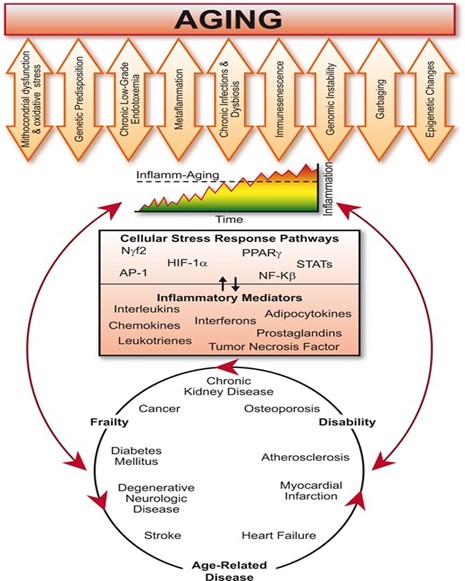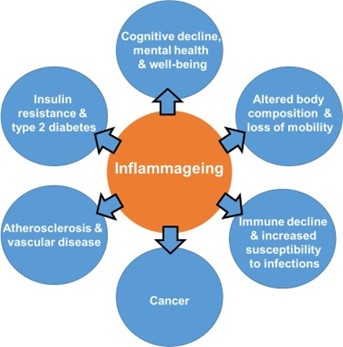Role Of Inflammation In Ageing (Inflammaging)
Introduction
Inflammaging is a term used to describe the changes that a human body undergoes due to inflammation and ageing. The term was coined in the early 2000s and has since been used to describe the inflammatory processes that take place in an ageing person. It is a well-known fact that several inflammatory diseases are exacerbated by the process of ageing. Many cardiovascular diseases (CVD), neurodegenerative diseases and other chronic diseases have a higher incidence with the increase of age. Some epidemiological studies have revealed that inflammation is a robust part of ageing and therefore plays a crucial role in the progress of health conditions [1]. Low-grade chronic inflammation is usually a key part of the ageing process and has been seen in many elderly studies, where inflammatory markers are usually raised in the elderly and contribute to disease progression [2]. In contrast, inflammation is a vital process that is responsible for several protective mechanisms of the human body. The effects of this inflammation are usually unnoticed in childhood, however with age, the inflammation can have a detrimental effect on the human body. Therefore, for the most efficient outcomes in ageing, there must be an intricate balance between inflammaging and anti-inflammaging [3].
Role of inflammation in ageing
With the advancement of medicine, global life expectancy has drastically increased since the last century. The increase in life expectancy revealed an interesting low-grade chronic inflammation in the elderly population. With an increase in medical investigation, it was evident that with age the inflammatory markers seem to be elevated. Thus, this was not a coincidental finding and pointed towards the fact that inflammation plays an important role in ageing processes. Inflammaging can be broadly split into two categories: the innate immune system and pro-inflammatory markers and adaptive immunity. Interestingly, while the innate immune system seems to have an increased role in ageing, the adaptive immune system wanes off with age [4]. Inflamm-ageing is associated with frailty, motor, and cognitive disability and overall mortality as well as is a recognized risk factor for most chronic degenerative diseases including cancer, dementia, renal, and CV disease [5]. Figure 1 illustrates the association of ageing with inflammation and disease. Although, the precise role of inflammation in ageing is not yet fully understood, there are several factors that may determine the role of inflammation in ageing. Some studies suggest that a raised C-Reactive protein (CRP) which is a type of inflammatory marker in the blood is highly associated with age and cardiovascular diseases [6]. It is difficult to isolate a single trigger that explains the inflammation that occurs in ageing. However, several biological and molecular reactions take place which contribute to the inflammation in ageing. These mechanisms include cellular senescence and particularly immune-senescence, telomere shortening, genomic instability, defects in protein catabolism, dysregulation of autophagy and mitophagy, alteration of the host microbiota (i.e. dysbiosis) and chronic infections (e.g. cytomegalovirus and periodontitis), mitochondrial dysfunction, and chronic exposure to toxins at low level (e.g. chronic low-grade endotoxemia, perhaps derived from the intestinal microbiome and accentuated by impaired epithelial barrier function with age or illness) [7].

The relevance of low-grade inflammation to health
As stated earlier, ageing is a concentration of pro inflammatory markers in the bloodstream [8]. Low grade inflammation is associated with health complications in the elderly including, mental health problems, loss of mobility, infections, and cancers. Figure 2 illustrates the impact of inflammaging on health in the elderly. There are an increasing number of studies which are increasingly showing the relationship between inflammation and ageing. Even mild inflammation chronically contributes to major diseases such as cardiovascular diseases, type 2 diabetes and mortality [9].

In older people the higher levels of circulating iterleukin-6 (IL-6), an inflammatory marker has been associated with reduced hand grip and explosive leg power [10]. This also could demonstrate the development of a disability with ageing and subsequently a higher risk of mortality. Another role that inflammation takes part in a crucial ageing process is frailty. Frailty is a syndrome characterised by generalised physiological decline. Diagnosis often involves evaluation of involuntary weight loss, exhaustion, low physical activity, slowness and weakness [11]. Therefore, it cannot be undermined based on recent evidence that inflammation may have a pivotal role in the ageing process and the counteractive mechanisms of ageing may help resolve the aforementioned issues.
Diet and its influence on inflammaging
Unsurprisingly healthy diet has shown to have lower amount of circulating inflammatory markers in the blood. Some diets such as healthy vegetarian diets and Mediterranean diets have revealed lower inflammation and consequently healthier ageing [12]. There are also some studies that suggest that a higher BMI is also associated with an increased risk of inflammaging. A higher intake of whole grains, fruits, nuts and fish are all associated with lower inflammation [12]. Therefore, diet and lifestyle have an important impact on inflammaging. Eating healthier is associated with better outcomes in ageing process.
Conclusion
Ageing is a complex phenomenon that is experienced by every individual on a different spectrum. Inflammation is an important aspect of the human immune system, which also plays a pivotal role in the process of ageing. Ageing is not only the changes that are experienced by humans through a period of time but also how an individual’s ageing process differs from another based on the triggers. For example: a middle-aged person with an average sedentary lifestyle may have a worse outcome in ageing compared to an elderly person with a healthier lifestyle. Inflammation has been deemed as a sinister mechanism which contributes to the detrimental effects of ageing. Therefore, the inflammaging phenomenon has to be studied further. Inflammation can be controlled either by medical intervention with anti-inflammatory markers or by lifestyle and diet. Studies have suggested that with better control of inflammation the outcomes of ageing are better. Although with this evidence it is understood that inflammaging may open new avenues to the future of medicine but there is an evident gap in knowledge. Therefore, for the future prospect further research is required to understand how exactly inflammaging impacts an individual’s ageing process.
If you would like a comprehensive panel including inflammatory markers then book in with us.